Community website by MBC/Ernest Abrams. Call 808-739-9797 for advertising/sponsorship.
First Friday Hawaii
News Item- Powered by MBC NewsMaker
Homeless deaths demonstrate need to house vulnerable population
- Tweet

A homeless person in Chinatown (2014).
HONOLULU — An analysis by Medical Examiner Dr. Christopher Happy shows 373 people who were considered homeless at the time of their deaths have died on O‘ahu from 2014 through 2018, a period of five years. The average age of death amongst this vulnerable population was 52.6 years, well below the current life expectancy in the U.S. of 78.6 years old and more than 80 years old here in Hawai‘i.
The cause of death for the 373 individuals were varied, but some patterns did emerge, for example, disease and poor hygiene, violence, the abuse of narcotic drugs, and even drowning (see attached PDFs).
Attachment 1 - Homeless Cause of Deaths on Oahu 2014-2018
Attachment 2 - Homeless Location of Deaths on Oahu 2014-2018
“The truly compassionate thing to do for our homeless population is to get them into shelter and off our streets where statistics show they are more likely to die at a relatively early age,” said Mayor Kirk Caldwell. “The statistics gathered by the medical examiner is a sobering wake-up call, and even for the shelter-resistant population, we need to get them into supportive housing as soon as possible and not allow them to die needlessly. This is what my program of ‘Compassionate Disruption’ is all about.”
“Compared to O‘ahu’s general population those who are homeless have a higher rate of death from drug abuse, infectious diseases, and in far too many instances, they fall victim to homicide,” said Medical Examiner Dr. Happy. “We have also found the investigation of homeless deaths is much more difficult due to a lack of social and familial ties, which are often used to determine the circumstances surrounding how someone dies. It???s clear from the data that we gathered that living on the streets leads to an early death.”
The breakdown of homeless deaths during the five year period is as follows:
2018 - 90 deaths
2017 - 70 deaths
2016 - 78 deaths
2015 - 63 deaths
2014 - 72 deaths
“The statistics are startling and show us that our streets and other public areas are not fit for human habitation,” said Office of Housing Executive Director Marc Alexander. “As an island community that believes in the principle of ‘aloha,’ true compassion is helping people into stable shelter and supportive housing where their health needs can be addressed.
“As a society, we are responsible to care for all human beings,” added Pam Witty-Oakland, director of the Department of Community Services. “How we treat the ill members of our society speaks to our compassion, and I challenge everyone to demonstrate their concern by helping to get the homeless population off city streets where their lives are being threatened every day.”
Questions? Ready for an appointment?
Featured Product/Service
- RELATED LINKS
About First Friday
Learn about First Friday Honolulu Gallery Walk in downtown Honolulu / Chinatown area.Current Events and Exhibits Calendar
Check out upcoming exhibits, shows and events for the next First Friday.First Friday News
Keep up with the latest news from the First Friday community - special events, calendars, Downtown/Chinatown news, art news and much more!First Friday Featured Pages
Artist, galleries, maps, parking, shopping, restaurants and much more. More...Featured Sponsors Offers
Great offers from our sponsors who support the First Friday Hawaii.com Community More...
Please send questions about this website to
Copyright© 2006 - 2019 FirstFridayHawaii.com. All rights reserved.
Terms of Use / Legal Disclaimer / Privacy Statement
Site Designed and Managed by MacBusiness Consulting
Terms of Use / Legal Disclaimer / Privacy Statement
Site Designed and Managed by MacBusiness Consulting
